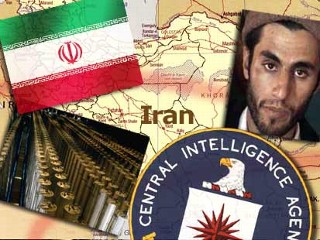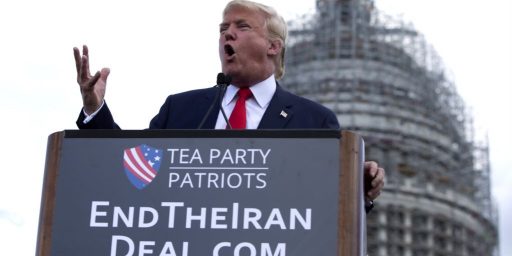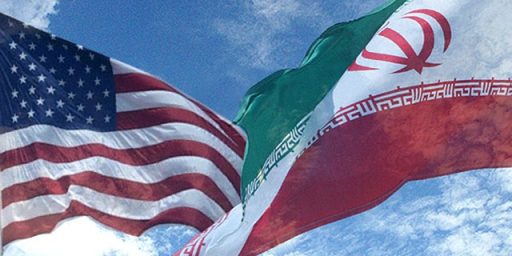Why the NIE Did a 180 on Iran
 In a piece entitled “New Data and New Methods Lead to Revised View on Iran,” NYT reporter Mark Mazzetti sheds some light on how reforms in the intelligence community led to a 180 degree change in the consensus on Iran’s nuclear weapons program in only two years.
In a piece entitled “New Data and New Methods Lead to Revised View on Iran,” NYT reporter Mark Mazzetti sheds some light on how reforms in the intelligence community led to a 180 degree change in the consensus on Iran’s nuclear weapons program in only two years.
Current and former intelligence officials insist that much of the 2005 Iran report still holds up to scrutiny. At the same time, they acknowledge that in retrospect, some of its conclusions appear to have been thinly sourced and were based on methods less rigorous than were ultimately required under an intelligence overhaul that did not begin in earnest until later. It was also written by some of the same team that had produced key parts of the flawed Iraq estimate. Robert D. Walpole oversaw both reports as the national intelligence officer responsible for assessing illicit-weapons programs.
[…]
The officials said that the 2007 estimate was an attempt by spy agencies to examine the Iran problem in a new light, and that in the process they recast many of their principal judgments about Iran’s weapons programs that might have relied on outdated information. Some sources used for the 2005 estimate were discarded for the new report, and some old information that intelligence agencies did not use for the 2005 estimate was re-examined and included in the estimate released Monday.
[…]
Government officials said the new judgments were grounded largely in information from human sources that is buttressed by other information gathered by spy satellites and communications intercepts.
[…]
Over the past year, officials have put into place rigorous new procedures for analyzing conclusions about difficult intelligence targets like Iran, North Korea, global terrorism and China. Analysts from disparate spy agencies are no longer pushed to achieve unanimity in their conclusions, a process criticized in the past for leading to “groupthink.” Alternate judgments are now encouraged.
In the case of the 2007 Iran report, “red teams” were established to test and find weaknesses in the report’s conclusions. Counterintelligence officials at the C.I.A. also did an extensive analysis to determine whether the new information might have been planted by Tehran to throw the United States off the trail of Iran’s nuclear program.
One result was an intelligence report that some of the intelligence community’s consistent critics have embraced. “Just possibly, the intelligence community may have taken a major step forward,” Senator Rockefeller said.
This seems to buttress the front page report in yesterday’s WaPo by Dafna Linzer and Joby Warrick.
Senior officials said the latest conclusions grew out of a stream of information, beginning with a set of Iranian drawings obtained in 2004 and ending with the intercepted calls between Iranian military commanders, that steadily chipped away at the earlier assessment.
In one intercept, a senior Iranian military official was specifically overheard complaining that the nuclear program had been shuttered years earlier, according to a source familiar with the intelligence. The intercept was one of more than 1,000 pieces of information cited in footnotes to the 150-page classified version of the document, an official said.
Several of those involved in preparing the new assessment said that when intelligence officials began briefing senior members of the Bush administration on the intercepts, beginning in July, the policymakers expressed skepticism. Several of the president’s top advisers suggested the intercepts were part of a clever Iranian deception campaign, the officials said.
Intelligence officers then spent months examining whether the new information was part of a well-orchestrated ruse. Their effort included “Red Team” exercises in which groups of intelligence officers tried to punch holes in the new evidence, substantially delaying publication of the NIE.
TIME intelligence analyst Robert Baer argues that the key difference was not a change within the bureaucracy but rather a new directive from the top.
The real story behind this NIE is that the Bush Administration has finally concluded Iran is a bridge too far. With Iranian-backed Shi’a groups behaving themselves, things are looking up in Iraq. In Lebanon, the anti-Syrian coalition and pro-Syrian coalition, which includes Iran’s surrogate Hizballah, reportedly have settled on a compromise candidate, the army commander General Michel Suleiman. Bombing Iran now would upset the fragile balance in these two countries. Not to mention that Hizballah has threatened to shell Israel if we as much as touch a hair on Iran’s head.
Then there are the Gulf Arabs. For the last year and a half, ever since the Bush Administration started to hint that it might hit Iran, they have been sending emissaries to Tehran to assure the Iranians they’re not going to help the United States. But in private, the Gulf Arabs have been reminding Washington that Iran is a rabid dog: Don’t even think about kicking it, the Arabs tell us. If you have to do something, shoot it dead. Which is something the United States can’t do.
There’s little doubt in my mind that this is indeed the considered judgment of the White House and, despite preferences in some quarters, has been for years. I’m rather dubious, however, that the turnaround in the NIE was a directive from on high.
Regardless, Baer is probably right here:
So how far is Iran from a nuke? The new NIE says 10 to 15 years, maybe. But that’s a wild guess. The truth is that Iran is a black hole, and it’s entirely conceivable Iran could build a bomb and we wouldn’t know until they tested it.
Virtually every change of that magnitude in the international order comes as a complete surprise to us. The fall of the Berlin Wall. The collapse of the Soviet Union. Saddam’s invasion of Kuwait. The 9/11 attacks. North Korea’s nukes. Pakistan’s nukes. We’re just incredibly inept at predicting the future.
Image source: ABC News






If only it were the future! Our intelligence community has been rotten at characterizing the present realistically. Despite the enormous resources poured into information gathering on the Soviet Union for decades our intelligence community systematically overestimated Soviet capabilities over a period of 50 years.
The overestimation didn’t reduce tensions or carnage. But it did create the proxy system whose echoes are still visible in current policy.
I don’t know many who are not “inept” at predicting the future. Perhaps we are expecting too much.
When it comes to threat assessments I would prefer an overestimation. It is the prudent way of doing things.
I find it funny how so many are spinning this as bad for the administration. It is neither bad nor good. It is simply the way it is. Intelligence changes and leaders react to those changes. Unless you are conspiracy minded and think Bush wants to bomb Iran for no reason rather than Bush seeing it as a necessity for our security why would anyone consider this a defeat for the President?
Given that he invaded Iraq for no reason, you’d need to be catatonic not to think it.
I’d guess Sy Hersh has it about right- for the past year the gap between what the intelligence agencies were discovering and the Bush Admin rhetoric on Iran has been widening at an alarming rate. Bush’s ‘world war three’ statement was probably the last straw and the push back against an out of control and irresponsible administration has finally begun.
Steve may not see a problem with the new estimate, but for a majority in the country it once again underlines the dishonesty of the man and his allies.
This statement strikes me as being either deliberately stupid or tragically insane. It’s been widely reported that the final form of this NIE has been locked-in since at least early October, and the basic conclusions have been known in higher circles for about a year now. Yet Cheney and his fellow Neocons have continued to trumpet the “Iran is a smoking mushroom cloud threat” through it all. Furthermore, Bush’s own statements after the release of the NIE continue to follow that same path. This is not the administration’s conclusion, but rather reality rearing its ugly head & Bush being forced, slowly, to deal with it.
180 degrees is statistically identical to a coin flip. Why would a rational person believe these knuckleheads?
I just watched a clip of Bolton on O’Reilly last night. Bolton said that the report was shared with the intelligence committees last week and that the main finding – that they stopped in 2003-was not indluded.
Well, considering that ADM McConnell discussed it with Bush back in August, I’d feel comfortable calling bullshit on this. Exactly what position does he hold that gives him credible access to that information, anyway? He hasn’t been a formal employee of the gov’t since last December – he flat-out doesn’t know what he’s talking about.
“Bush’s ‘world war three’ statement was probably the last straw and the push back against an out of control and irresponsible administration has finally begun.”
If that statement is really true then we should all be VERY worried for the CIA is now deciding US foreign policy. Bush, like him or not, IS the elected prez and he makes that policy call.
This does mean Bush won’t be bombing Iran over its nuc program. Lets hope he now decides to get extremely aggressive about Iran’s supplying EFPs and weapons/training to Iraqi insurgents. The focus on nuc program meant a measured approach to targeting Iranian networks within Iraq. Now the gloves should come off around destroying the networks and weapons shipments. Those ARE costing US soldiers their lives so its past time for giving Iran “a hard shoulder” on that.
Did North Korea “stop” their program and somehow still manage to turn up a bomb….?